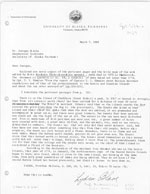Wrangell 1760
Start: 1760 [1]
Event Type: Other
Description: The 1760 and 1784 eruptions of Wrangell are questionable, poorly documented, and may in fact refer to a volcano other than Mt. Wrangell. Dall (1870) says that "Chechitno" smoked in 1760, and again in July 1784.
These eruptions are first reported by Grewingk (1850, translated 2003 by Fritz Jaensch) as being from Chetchina, which he says is one of the Andreanof Islands. Petroff (1884), translating Grewingk, reports 1760 and 1784 eruptions from Chechina. Also derived from Grewingk, Dall (1870) and Becker (1898) report eruptions from Chechitno in 1760 and 1784. Becker (1898) states: "Mount Wrangell lies at a distance of about 134 miles from the head of Prince William Sound, and, according to Lieut. H. T. Allen, it reaches the great height of 17,500 feet. It was steaming at the date of his visit. It is the loftiest of a group of high mountains, one of which, named Mount Blackburn by Mr. Allen, is only 30 miles from the junction of the Copper River and the Tschichitna, Chechitna, or Chittyna River. I suppose this latter mountain to be that called by earlier writers the Chechitno volcano." Translation of Shmalev (found in Juergen Kienle's files) equates the Island of Chetkhina with Great Sitkin, which has historical accouts of eruptions in 1760 and 1784. According to the Smithsonian Institution Chechitno is a synonym of Wrangell. Additionally, according to Grewingk (1850, translated 2003 by Fritz Jaensch), Mt. Wrangell was not discovered until 1819.
These eruptions are first reported by Grewingk (1850, translated 2003 by Fritz Jaensch) as being from Chetchina, which he says is one of the Andreanof Islands. Petroff (1884), translating Grewingk, reports 1760 and 1784 eruptions from Chechina. Also derived from Grewingk, Dall (1870) and Becker (1898) report eruptions from Chechitno in 1760 and 1784. Becker (1898) states: "Mount Wrangell lies at a distance of about 134 miles from the head of Prince William Sound, and, according to Lieut. H. T. Allen, it reaches the great height of 17,500 feet. It was steaming at the date of his visit. It is the loftiest of a group of high mountains, one of which, named Mount Blackburn by Mr. Allen, is only 30 miles from the junction of the Copper River and the Tschichitna, Chechitna, or Chittyna River. I suppose this latter mountain to be that called by earlier writers the Chechitno volcano." Translation of Shmalev (found in Juergen Kienle's files) equates the Island of Chetkhina with Great Sitkin, which has historical accouts of eruptions in 1760 and 1784. According to the Smithsonian Institution Chechitno is a synonym of Wrangell. Additionally, according to Grewingk (1850, translated 2003 by Fritz Jaensch), Mt. Wrangell was not discovered until 1819.
References Cited
[1] Grewingk's geology of Alaska and the Northwest Coast of America [edited by Marvin W. Falk, translation by Fritz Jaensch published 2003], 1850
Grewingk, Constantine, 1850, Grewingk's geology of Alaska and the Northwest Coast of America [edited by Marvin W. Falk, translation by Fritz Jaensch published 2003]: Rasmuson Library Historical Translation Series 11, Fairbanks, AK, The University of Alaska Press, 242 p.[2] Reconnaissance of the gold fields of southern Alaska with some notes on general geology, 1898
Becker, G. F., 1898, Reconnaissance of the gold fields of southern Alaska with some notes on general geology: U.S. Geological Survey Annual Report 0018, p. 1-86, 6 sheets, scale unknown.[3] Alaska and its resources, 1870
Dall, W. H., 1870, Alaska and its resources: Boston, Lee and Shepard, 627 p.[4] The volcanic region of Alaska, 1884
Petroff, Ivan, 1884, The volcanic region of Alaska: in Population, Industries, and Resources of Alaska, Washington DC, Government Printing Office, p. 93-96.[5] Reported volcanic eruptions in Alaska, Puget Sound, etc., 1690-1896, 1898
Plummer, F. G., 1898, Reported volcanic eruptions in Alaska, Puget Sound, etc., 1690-1896: in Holden, E. S., (ed.), A Catalogue of Earthquakes on the Pacific Coast 1769-1897, Smithsonian Institution Miscellaneous Collections 1087, City of Washington D.C., Smithsonian Institution, p. 24-27.Complete Eruption References
Geology of the central Copper River region, Alaska, 1905
Mendenhall, W. C., 1905, Geology of the central Copper River region, Alaska: U.S. Geological Survey Professional Paper PP 0041, 133 p., 1 plate, scale 1:63,360.
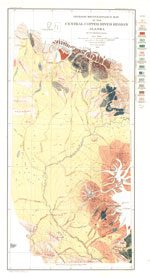
Reconnaissance of the gold fields of southern Alaska with some notes on general geology, 1898
Becker, G. F., 1898, Reconnaissance of the gold fields of southern Alaska with some notes on general geology: U.S. Geological Survey Annual Report 0018, p. 1-86, 6 sheets, scale unknown.
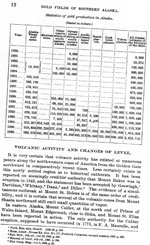
Reported volcanic eruptions in Alaska, Puget Sound, etc., 1690-1896, 1898
Plummer, F. G., 1898, Reported volcanic eruptions in Alaska, Puget Sound, etc., 1690-1896: in Holden, E. S., (ed.), A Catalogue of Earthquakes on the Pacific Coast 1769-1897, Smithsonian Institution Miscellaneous Collections 1087, City of Washington D.C., Smithsonian Institution, p. 24-27.

The volcanic region of Alaska, 1884
Petroff, Ivan, 1884, The volcanic region of Alaska: in Population, Industries, and Resources of Alaska, Washington DC, Government Printing Office, p. 93-96.
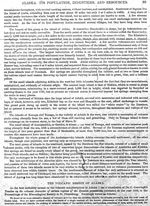
Alaska and its resources, 1870
Dall, W. H., 1870, Alaska and its resources: Boston, Lee and Shepard, 627 p.
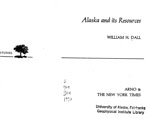
Grewingk's geology of Alaska and the Northwest Coast of America [edited by Marvin W. Falk, translation by Fritz Jaensch published 2003], 1850
Grewingk, Constantine, 1850, Grewingk's geology of Alaska and the Northwest Coast of America [edited by Marvin W. Falk, translation by Fritz Jaensch published 2003]: Rasmuson Library Historical Translation Series 11, Fairbanks, AK, The University of Alaska Press, 242 p.
Hard Copy held by AVO at FBKS - CEC shelf
Volcano observations,
Kienle, Juergen (comp.), Volcano observations: Notes about volcanoes and volcanic eruptions collected, made, and stored by Juergen Kienle, on file at University of Alaska Fairbanks, Geophysical Institute, unpublished, unpaged.
